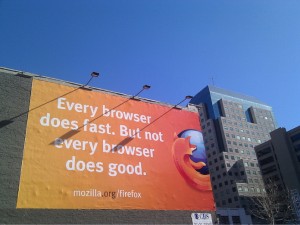San Francisco is big on non-profit alternatives. I know this because we’ve done some asking around (and looking at other research) as we attempt a brand realignment on our TIX Bay Area discounted ticketing service. It turns out that, all other things being equal (a big caveat), a good percentage of Bay Area consumers will opt for a socially-helpful version of a service over a straight-up corporate one. As such, we will be touting the fact that we’re the only non-profit ticketing vendor in the Bay Area…we’ll see if it works, because that pesky “all other things being equal” bit is hard when the other thing is well-funded, well-oiled, all-it-does-is-this-stuff-all-day-long Goldstar. But we’ll see.
Anyway, I’ve got public value arguments on the brain because of those discussions, so imagine my surprise when I was driving around San Francisco and saw an entire ad campaign touting public value—for a web browser.
Mozilla, as you may or may not know, is a nonprofit company that develops open-source products, including the well-respected Firefox internet browser. And they’ve apparently been reading the same stuff we’ve been reading, because their entire campaign is about their “goodness” in the face of the super-corporate alternatives. Taglines include:
- “Every browser does fast. Not every browser does good.”
- “.com brains .org heart”
- “Doing good is part of our code.”
- “The browser with soul.”
Here in the Bay Area, we also have a nonprofit giant-insurance-HMO, Kaiser Permanente, whose public value campaigns are so convincing it almost makes me (who has had Kaiser for years, and can tell you it’s the same pain in the ass as any other insurance company) forget that their default is business-as-usual. Narrated with sultry wit by The West Wing’s Allison Janney, KP’s Thrive television and radio ads have long been more about general wellness and less about specific services provided, but recently they’ve taken a turn and now, ironically, are focusing on the health benefits of the arts on individuals. Imagine that, a campaign that focuses on the benefits of doing art. From an insurance company. See (well, listen) here.
They’re both good campaigns, in my book. Kaiser’s ads, as I said, are fantastic – they’re beautifully done, with deep color palettes and very clever copy, lots of healthy, smiling, diverse people being healthy, enjoying life, falling in love, living long and thriving. Mozilla’s, while vaguer, is also clever, and surprisingly clear. And when Iobjectively, much as I find Kaiser quirky and difficult to deal with sometimes, I have a general positive association with them as caring about more than just my bills.
Where this gets me in terms of New Beans is more abstract, maybe. There’s something vaguely aggravating to me about these organizations, which, while technically nonprofits, are hugely successful business enterprises without a true social welfare mission, co-opting public value arguments that we should be making. And at the same time, given that we don’t really spend a lot of time making them, maybe having someone else do it isn’t the worst thing. And, at least in terms of Kaiser, it’s not just smoke—they also have a thriving theatre program that takes health-themed short plays into local schools to teach kids about being healthy through art.
We nestle public good in our mission statements. Why aren’t we shouting it out in our advertising?


Perhaps, for the performing arts, it is more important to “do good” onstage than elsewhere if you want to sell tickets. Few people treat a night out at a theatre or concert hall as a charitable event, but rather a way of enjoying themselves with some theatre, music or dance.
While I applaud your awareness of corporate missions and technical expertise, developing audiences is not at all the same ball game.
When the NEA’s Rocco Landesman said there are too many theatres in a declining market, part of the reason is so many are trying to “brand” themselves, which is the totally wrong approach to finding audiences. Selling tickets is an event oriented activity, and instead of looking to corporations for models, look at film and concert marketing.
It’s a very complicated process to get Joe Average off his duff and into a theatre. But it can be done.
You make a good point. What the arts have to offer is, ironically, what everyone else is selling. Corporate America says: buy our stuff and you will be happier, feel better, be smarter, be stronger, be emotionally moved, etc. All of which, to varying degrees and in different moments, are the actual outcomes of experiencing a performance or exhibition. They’re selling our outcomes as the reaosn to buy their product, while we struggle to sell our product.
Hmmm.